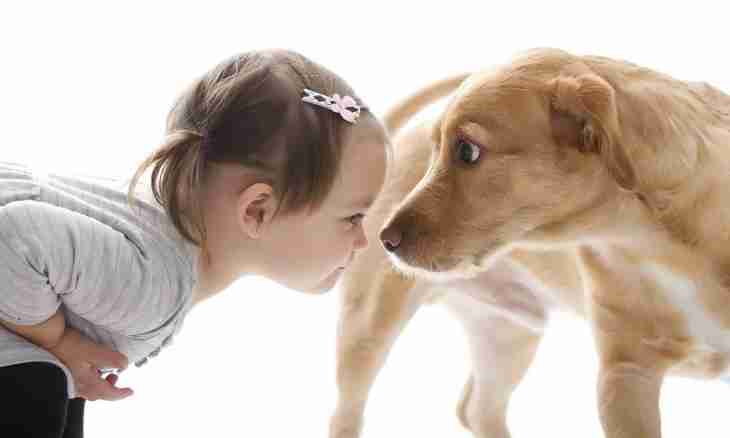The problem "children and dogs" is relevant for many parents as sooner or later practically each of them will hear "I want a puppy", "I want a doggie" or "what lovely doggie, I want same". In some families the adults positively perceive this idea and get dogs. But what do not like to do to those parents who neutrally treat dogs or at all them?
The dog is not only the favourite of family and the friend of children, but also serious responsibility. And for some adults also big inconvenience as many new efforts are added: feeding, training and education, care for claws, wool, teeth and ears, walks, etc. And cleaning will increase.
Psychological aspect
Psychologists allocated three main reasons why the child wants to get a dog:
- Attempt by means of a dog to become more successful in the opinion of people around. In such situation the dog for the child becomes way drawing attention, attempt to become similar to the friends, way to get to the new company. The child represents how he it will be proud to walk with a dog in the yard, and all children will want to make friends with it to iron a dog.
- Attempt to stop being lonely. Such children usually have no friends and the companies for games therefore dogs become true friends and defenders.
- Dog as new toy. At some children, especially absolutely small, all desires of children though are strong, but are spontaneous. At the same time they up to the end do not realize that the dog is a living being who can live in the house of 10-15 years, and at the same time it is necessary to care for it.
The first two reasons, though seem serious, actually are not a reason for alarm. Children still learn to live in this world, to communicate and interact with people. It is important to understand that emergence in the house of a dog will not solve these problems. An occasion to prick up the ears is the third reason when the child does not see differences between the living being and a toy. If in time not to impart to the child feeling of compassion to living beings, it can pour out in cruelty.
To get or not to get?
The main reason for which it is worth getting a dog — desire of parents and their readiness for care for the new family member. Even if the dog was got for the child, parents are responsible for her.
Kind of strongly the child did not ask, did not beg, did not cry, did not promise to feed, walk, wash, clean after it, fully owing to psychological features of children's age he is not ready to undertake such responsibility.
Some parents, before agreeing to appearance of a dog in the house, arrange to children of test. For example, force them to rise every morning at 7 in the morning and to go outside to walk a toy dog, to vacuum every day and to wash the floor. But even successful passing of these tests does not guarantee that the child completely will be able to undertake care for a real dog. And especially to bring up and train her.
Children grow, their interests, desires and aspirations develop, change. Therefore the child should not have sense of guilt for refusal in acquisition of a dog.
